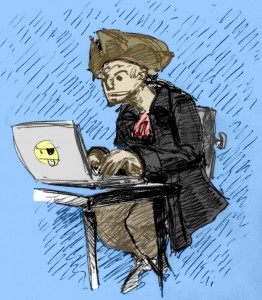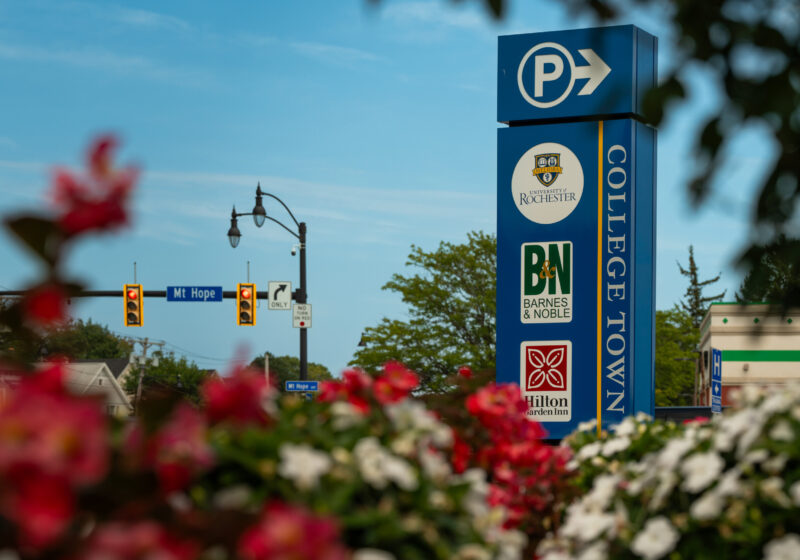Not all pirates are from the Caribbean, loot treasures, and drink Bacardi rum. Some illegally download and distribute music, movies, games, and software online. Commonly known as ‘Internet piracy,’ the practice has often been cited as copyright infringement and remains a controversial subject on college campuses.
Last year alone, there were over 400 documented cases of online piracy at UR. National averages closely mirror the situation at UR. According to the UR’s Information Technology Policy, the University reserves access to personal communication records “to investigate or prevent a violation of law or University Policy.” UR, however, normally does not actively monitor communications and instead focuses its efforts on the investigation of outside claims.
While opponents of online piracy decry the action as theft of intellectual property, supporters argue that freedom of information on the Internet preclude file sharing from being included as theft.
Today, the two predominant manifestations of Internet piracy are direct file downloads and peer-to-peer file sharing. A direct file download is the transfer of a file to a device directly from another source. Comparable to downloading a song from iTunes, direct file downloads allow the user to download an entire file from a single source. The now defunct Megaupload is a prime example of an online service that allowed users to illicitly upload and download copyrighted files directly from its site.
Peer-to-peer file sharing in the context of Internet piracy is a much more decentralized and disjointed process. Unlike direct file downloads, peer-to-peer file sharing involves collecting the file in pieces before consolidating it to form the original copyrighted file. This process can be compared to collecting puzzle pieces from many different people before putting together the final picture. Current services supporting peer-to-peer sharing include programs like uTorrent and sites like The Pirate Bay.
In general, enforcement of copyright laws falls to copyright holders. Civil liability is applicable in most copyright infringement cases, and the copyright holders may sue the violators for damages. In some egregious cases, including instances of copyright infringement for commercial gain, violators may be criminally liable. In the search for violations, the Motion Picture Association of America (MPAA) and the Recording Industry Association of America (RIAA) have been the most active. Both the MPAA and RIAA have continuously prosecuted the hosts and users of direct file download and peer-to-peer file sharing sites. Although private groups are usually responsible for enforcement, the Justice Department took unprecedented action by forcibly shutting down Megaupload in 2009, which until that point had been one of the most popular direct file download sites.
“[Internet piracy] comes to our attention. Third parties are usually the ones that let us know when students engage in activity,” Dean of Students Matthew Burns said, adding that “If there is an indication that someone is using excessive bandwidth that may impact the service of others on the network, an investigation will be conducted.”
The policy also states that UR would reserve access to personal communications to “comply with a subpoena, warrant, court order, or similar legal process, including a discovery request or a litigation stay order issued by or investigation undertaken by the Office of Counsel in connection with a potential claim in anticipation of litigation.”
Despite increased awareness of the legal repercussions that face offenders at UR, Burns acknowledged that “There are still a lot of violations out there.”
Aside from the possible litigation students face from the MPAA or RIAA, the University has its own disciplinary protocol. Students receive a warning from University IT and the Dean of Students office after their first violation, and following a second violation, students face NetID account suspension and official disciplinary action.
Nationally, some advocate for more leniency in copyright laws while others push for increased civil and criminal liability. Over time, this argument has spilled out from online chat rooms and onto the floor of Congress. This past year, laws that increased penalties for online piracy named Stop Online Piracy Act (SOPA) and PROTECT IP Act (PIPA) were introduced, debated, and eventually scrapped after massive public outcry.
With most copyright laws written before the advent of the Internet, there is still a significant gray area regarding online piracy. Current enforcement and punishment for online piracy remains in constant flux.
“We have seen the number of violations reduce year over year, but violations are still prevalent,” Information Security Officer Julie Myers said. “And the majority of the violators are students.”
When asked about the issue, sophomore Sarah Kitts said, “I don’t even know how the whole illegally downloading thing works.”
Others are more familiar.
“I haven’t downloaded music legally since the eighth grade,” a junior, who chose to remain anonymous, said.
While it may seem that most UR students would be proponents of online piracy and the free distribution of information online, there are those who believe online piracy hurts hardworking artists, musicians, and other copyright holders.
From both national rhetoric and student opinions here on campus, it is apparent that the debate over online piracy will remain a bone of contention in the foreseeable future.
Shinseki is a member of
the class of 2015.


